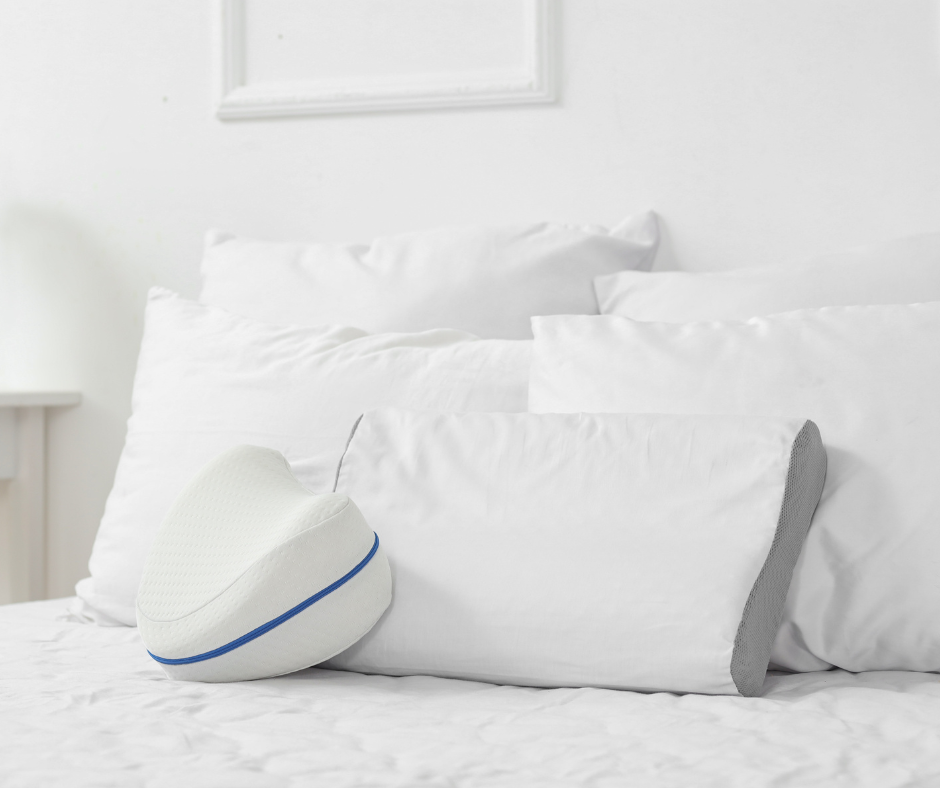24/7 online booking

Which Pillow for Neck Pain? A Guide to Choosing the Right Support
Neck pain can be a real discomfort, disrupting sleep and making daily activities more challenging. While many factors can contribute to neck pain, one often overlooked aspect is the pillow you sleep on. Choosing the right pillow can significantly impact the quality of your sleep and help alleviate neck pain. In this blog, we'll explore how the right pillow can make a difference and provide tips on what to look for when choosing a pillow to support your neck.
The Importance of the Right Pillow
Your pillow plays a crucial role in maintaining proper spinal alignment while you sleep. If your pillow doesn’t provide the right support, it can lead to misalignment of the neck and spine, causing or exacerbating neck pain. A good pillow should support the natural curve of your neck, keeping it in a neutral position throughout the night. This helps reduce strain on the neck muscles and ligaments, preventing pain and stiffness.
Factors to Consider When Choosing a Pillow
-
Sleeping Position Your sleeping position greatly influences the type of pillow you should choose:
-
Back Sleepers: If you sleep on your back, look for a pillow that supports the natural curve of your neck. A medium-thickness pillow is often ideal, providing enough support to keep your head in line with your spine without pushing it too far forward.
-
Side Sleepers: Side sleepers need a firmer, thicker pillow that fills the space between the ear and the shoulder, keeping the neck straight and supported. A contoured pillow or one designed specifically for side sleepers can be particularly beneficial.
-
Stomach Sleepers: Sleeping on your stomach is not recommended for neck pain, as it can put strain on the neck. However, if this is your preferred position, choose a very thin, soft pillow or consider sleeping without a pillow to minimise neck strain.
-
-
Pillow Material The material of the pillow can also impact comfort and support:
-
Memory Foam: Memory foam pillows are popular for their ability to conform to the shape of your head and neck, providing customised support. They can help maintain alignment and reduce pressure points, making them a good option for many people with neck pain.
-
Latex: Latex pillows are another good choice as they offer a supportive yet responsive surface that can help maintain neck alignment. They are also hypoallergenic and durable.
-
Feather or Down: Feather and down pillows are soft and can be adjusted to fit the shape of your neck. However, they may not provide sufficient support for everyone, especially if you prefer a firmer pillow.
-
Orthopaedic Pillows: These are designed specifically to support the neck and can be particularly useful for those with chronic neck pain. They often have a contoured shape to better fit the natural curve of the neck.
-
-
Pillow Height and Firmness The height and firmness of your pillow should correspond with your sleeping position and personal comfort preferences:
-
High Pillows: These are typically best for side sleepers who need extra height to keep their spine aligned.
-
Medium Pillows: Medium-height pillows work well for back sleepers, offering a balance of support without overly elevating the head.
-
Low Pillows: Low pillows are best for stomach sleepers or those who prefer a more minimalistic approach, reducing strain on the neck.
-
Firmness: Firm pillows provide strong support and help keep the head and neck in alignment, particularly for side sleepers. Softer pillows may be more comfortable for back sleepers or those who move around a lot during the night.
-
-
Specialised Pillows There are various specialised pillows available that can help with neck pain:
-
Cervical Pillows: These are designed with a deeper depression in the centre to cradle the head and provide extra support for the neck. They can be particularly beneficial for those with chronic neck pain.
-
Water Pillows: These allow you to adjust the firmness by adding or removing water, providing a customised level of support. Water pillows can offer good support while also being adaptive to movement.
-
Cooling Pillows: If you find that heat aggravates your neck pain, a cooling pillow with gel-infused memory foam or breathable materials can help keep you comfortable throughout the night.
-
When to Replace Your Pillow
Even the best pillow won’t last forever. Over time, pillows lose their shape and support, which can contribute to neck pain. As a general rule, consider replacing your pillow every 1-2 years. Signs that it’s time for a new pillow include lumps, loss of shape, or if you wake up with neck pain that improves throughout the day.
Conclusion
Choosing the right pillow is essential for managing neck pain and ensuring a restful night’s sleep. By considering your sleeping position, the pillow's material, height, and firmness, you can find a pillow that supports your neck and reduces pain. If you're unsure which pillow is best for you, consulting with an osteopath can provide further guidance tailored to your specific needs. Remember, your pillow is a key part of your overall sleep environment, so investing in the right one is an investment in your health and well-being.
We recommend levtiex pillows as they offer the right support. You can visit their website here: Levitex | Sleep posture experts. Use discount code: LPP476 for a 10% discount.
If you would like to book and appointment with us, you can do so by clicking here.

Leave a comment